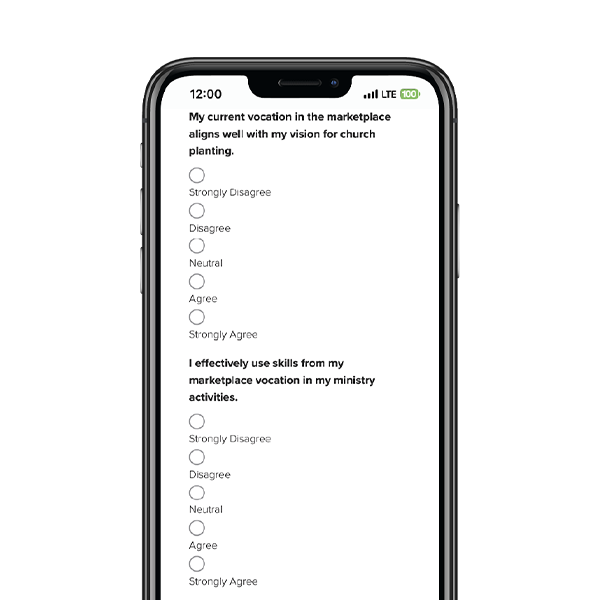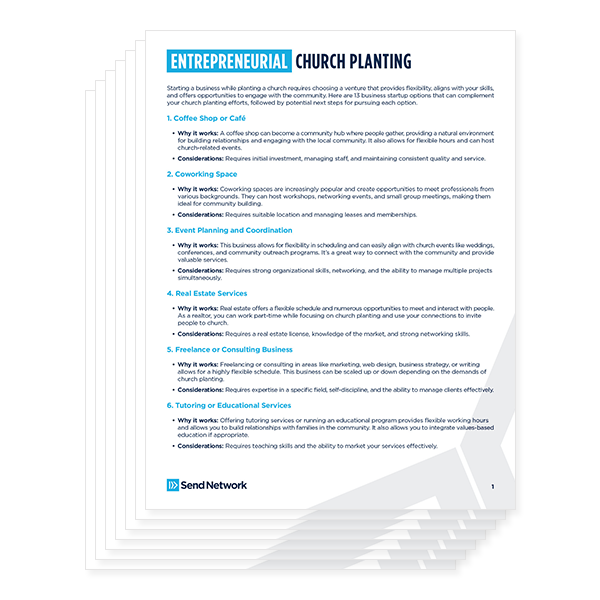This is a book excerpt from Church Planting Thresholds: A Gospel-Centered Guide by Clint Clifton. Download the full e-book here.
Tenacity
If you’re going to plant a new church or lead your church to plant a new church, you will have to maintain a deep resolve to endure the difficulties ahead. Church planting requires an unwavering commitment to preach, pray, evangelize, and stay. There will be many moments along the way when you will want to quit—I have certainly faced those times—but the best church planters I know are not the guys who started churches that grew to hundreds or thousands in a few short years, but they are those who continued faithfully through adversity….
Don’t allow yourself to grow hasty in the process of building God’s church. The work is too important and the stakes are too high. My experience planting churches and helping others plant churches has convinced me that the majority of problems new churches face stem from a compromise made in the church’s formation. Completing these stages will not ensure that the church you are attempting to plant will survive, but it will increase the odds that you avoid a pitfall along the way.
Thresholds
Since there are a number of definitions for the word “threshold,” I’ll explain exactly what I mean. A threshold is “a level, point, or value above which something is true or will take place and below which it is not or will not”[i] For each stage to be considered complete, there is a minimum threshold that must be reached.
Let me use a monetary example to explain. If you’re starting a church and plan to meet in a school or other rental facility, you will have to pay rent and insurance costs. Let’s say $1,000 per month. If you’re planning to earn your living as a church planter, you will have personnel costs. Let’s say $2,500 per month. If you’re planning to hold Bible studies, you will have curriculum costs—$200 per month. If you’re planning to save money for a future church planting effort, you need money for that—$300 per month. All of these needs add up to a particular dollar amount, and in this case it is $4,000. So $4,000 is the minimum amount you will need to accomplish all the things you plan to do. That’s the threshold. If your income falls below your threshold, you will be forced to do one of two things: settle for a less expensive and potentially less effective meeting facility, even though you know it’s not the best idea; or make a worse compromise by totally scrapping something that you believe will be good for the new church.
Neither abandoning nor adjusting your plan will get you any closer to planting this new church. Therefore, the thresholds are necessary in order to accomplish the aspirations you have for this new church. As you work through this material, you will notice that each stage in the planting process is associated with a number of thresholds. In most cases you, the church planter, in agreement with the elders of your sending church, should set these thresholds. The elders of your sending church, in addition to your mentor, will have the responsibility of holding you accountable to the thresholds when you are tempted to abandon or adjust them. Remember that thresholds are minimum requirements for moving on to the next step of the process. Exceeding the minimum thresholds is advisable when possible. As with most things in life, each stage will likely cost more and take longer than you expect. Having a little extra on hand at each step is prudent stewardship.
The Sending Church
I encourage you to fight the temptation to do this work alone. If a healthy church is sending you, seek the guidance of the church’s elders as you work through the stages and determine the thresholds. Communicate regularly with them and tell them when you are ready to move from one stage to another.
Keep in mind that the leaders of your sending church are likely occupied with matters related to the health and well-being of their own congregation. It is your responsibility to keep them informed of both the struggles and successes you experience along the way. This is particularly important if you are a young church planter or new to pastoral ministry. Young and inexperienced planters often have an independent rebellious streak, which is almost always sinful.
I know one church planter, “John,” who was a well-loved associate pastor at “Community Church” in his city. The ministry at this church had grown rapidly during his tenure, and both the staff and the congregation loved Pastor John. After serving at the church for a few years, Pastor John grew restless and began considering starting a new church. John went to Senior Pastor Bill to share the news of his new calling. Unlike most senior pastors, Bill responded with excitement. He promised to do all he could to lead Community Church to support John’s new work. With the endorsement of his senior pastor, John began sharing his dream with the rest of the staff and the congregation of Community Church. Excitement started to brew around the church for John’s new ministry. Community Church gave John a “hunting license” telling him he was free to recruit members from within the congregation to join his core team. As if that weren’t enough, Community Church promised to support him financially until the church got off the ground. John recruited hard, attempting to gather as much support as possible to launch his new church. When all was said and done, John had a large team from Community Church.
Of course, with all the momentum, the new church grew rapidly. John let all the success go to his head. He honestly believed that the success of the ministry was because of his outstanding leadership and charismatic preaching. It wasn’t long before John’s team began returning to Community Church. When they returned, they were shocked to find that Community Church was still struggling to recover from the loss of resources and members that left with Pastor John. The members who returned spoke negatively of John’s leadership and warned the members of Community Church against planting more churches. A few years later, another man at Community Church felt God’s call to plant a church. With memories of Pastor John still fresh in their minds, Community Church opted not to plant again.
A shortsighted church planter sees his job as simply to plant a church. Church planters should work hard to maintain good relationships with their sending and supporting churches so that those churches will endeavor to plant more churches in the future. Plainly speaking, if you’re planting a new church with the support of a more established one, you should both submit to and support your sending church as well as you can throughout the process.
[i] Merriam-Webster. Accessed January 8, 2016. https://www.merriam-webster.com/dictionary/threshold. (Entry 3b)
This is a book excerpt from Church Planting Thresholds: A Gospel-Centered Guide by Clint Clifton. Want to read more? Click here, to download the book for free.
_________________________________________________________________________
Listen to this episode of We Are Send Network to learn more about residency programs and raising up church planters and missional leaders from your congregation.
Published March 2, 2020




